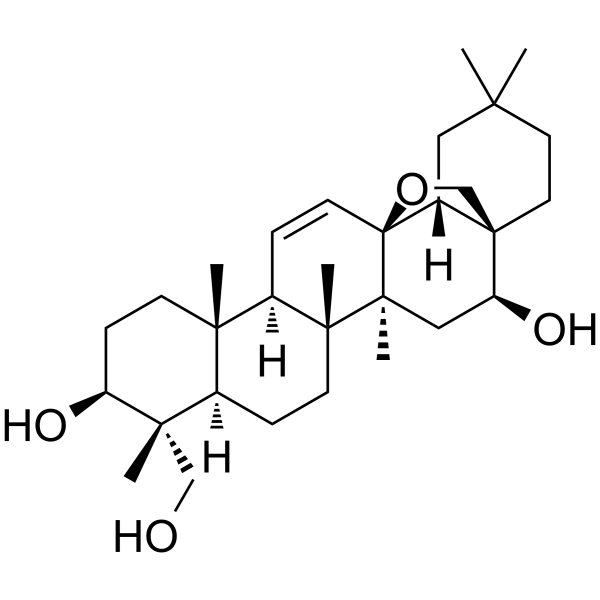
Saikogenin F
CAS No. 14356-59-3
Saikogenin F( —— )
Catalog No. M29389 CAS No. 14356-59-3
Saikogenin F is a natural product.
Purity : >98% (HPLC)
 COA
COA
 Datasheet
Datasheet
 HNMR
HNMR
 HPLC
HPLC
 MSDS
MSDS
 Handing Instructions
Handing Instructions
| Size | Price / USD | Stock | Quantity |
| 2MG | 209 | Get Quote |


|
| 5MG | 357 | Get Quote |


|
| 10MG | 536 | Get Quote |


|
| 25MG | 896 | Get Quote |


|
| 50MG | 1373 | Get Quote |


|
| 100MG | 2132 | Get Quote |


|
| 200MG | Get Quote | Get Quote |


|
| 500MG | Get Quote | Get Quote |


|
| 1G | Get Quote | Get Quote |


|
Biological Information
-
Product NameSaikogenin F
-
NoteResearch use only, not for human use.
-
Brief DescriptionSaikogenin F is a natural product.
-
DescriptionSaikogenin F is a natural product.(In Vitro):Saikogenin F(50, 70 and 90 μg/mL) inhibits the cell proliferation of A549 cells with inhibition rates of 18.81%, 47.64% and 86.01%.
-
In VitroSaikogenin F inhibits the proliferation of A549 cells with inhibition rates of 18.81%, 47.64% and 86.01% at concentrations of 50, 70 and 90 μg/mL, respectively.
-
In Vivo——
-
Synonyms——
-
PathwayOthers
-
TargetOther Targets
-
Recptor——
-
Research Area——
-
Indication——
Chemical Information
-
CAS Number14356-59-3
-
Formula Weight472.69970703125
-
Molecular FormulaC30H48O4
-
Purity>98% (HPLC)
-
Solubility——
-
SMILESCC1(C)CC[C@]23CO[C@@]4(C=C[C@@H]5[C@@]6(C)CC[C@H](O)[C@@](C)(CO)[C@@H]6CC[C@@]5(C)[C@]4(C)C[C@@H]2O)[C@@H]3C1
-
Chemical Name——
Shipping & Storage Information
-
Storage(-20℃)
-
ShippingWith Ice Pack
-
Stability≥ 2 years
Reference
molnova catalog



related products
-
BMS-P5
BMS-P5 is a specific and orally active Peptidylarginine Deiminase 4 (PAD4) inhibitor.
-
Alloisoimperatorin
Alloisoimperatorin is a candidate of AChE inhibitors, it displays potent antioxidant effects against the DPPH radical and against renal epithelial cell injury by using AAPH to generate peroxyl radicals in vitro.
-
GW-870086
GW-870086 is an effective anti-inflammatory agent. GW-870086 also plays a role in a glucocorticoid receptor agonist (pIC50: 10.1 in A549 cells expressing NF-κB).



 Cart
Cart
 sales@molnova.com
sales@molnova.com


